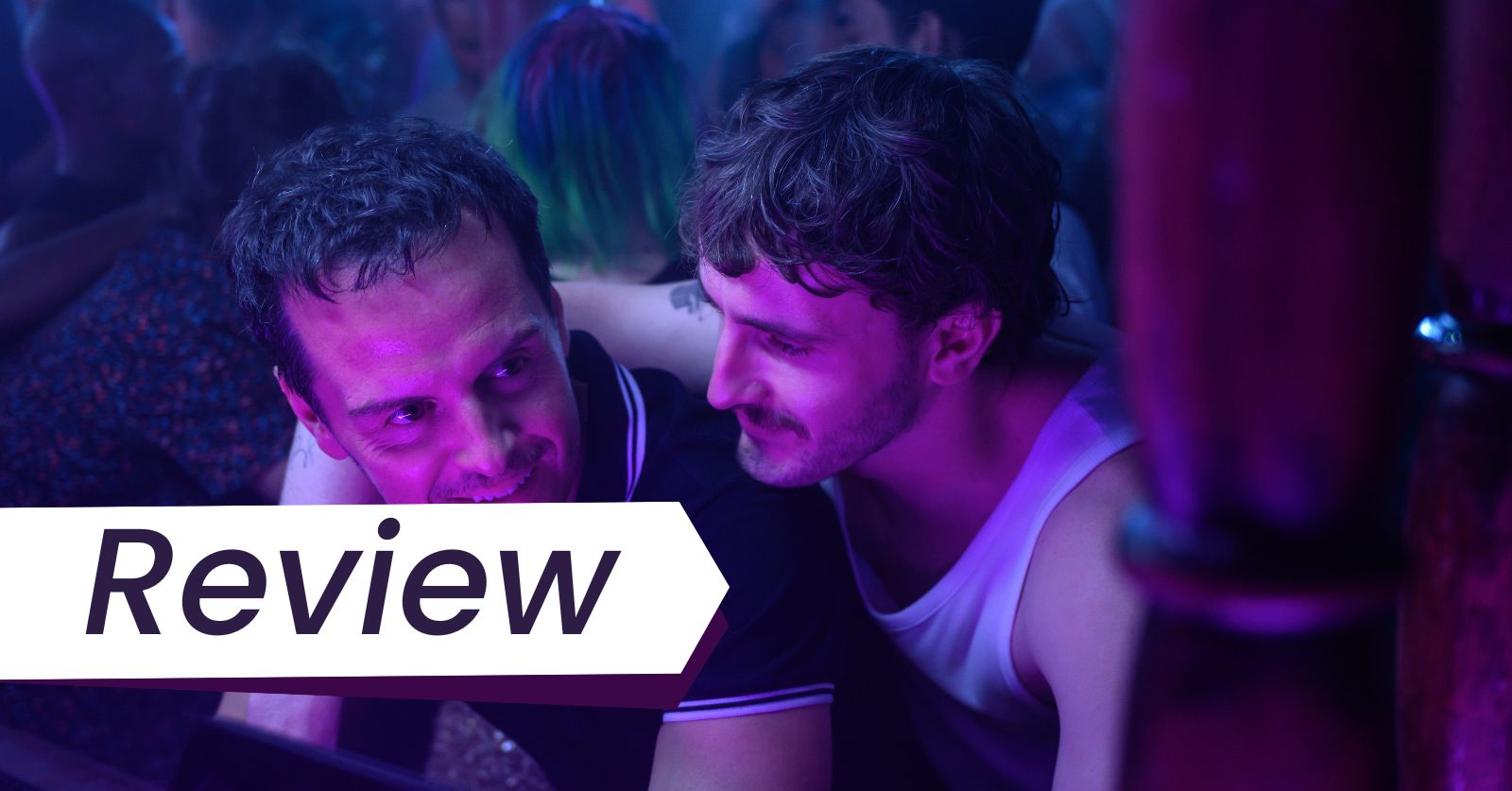Writer-director Andrew Haigh’s All of Us Strangers is part ghost story and part romance, and it feels like a warm hug.
Read our extensive writing on and interviews with Andrew Haigh and his team.
Get our ebook on Andrew Haigh’s Lean on Pete, available here

Discover one film you didn’t know you needed:
Not in the zeitgeist. Not pushed by streamers.
But still easy to find — and worth sitting with.
And a guide to help you do just that.
“They say it’s a very lonely kind of life,” comments Mum, who may be a ghost or a figment of Adam’s imagination. She looks the same as the day she died thirty plus years ago. Her fortysomething son Adam (Andrew Scott) has just unexpectedly come out to her, and she’s worried about him. “They don’t actually say that anymore,” Adam angrily rejoins. “Everything’s different now.” But when he goes over it again later that night in bed with his paramour Harry (Paul Mescal), he revises that statement to something less defensive and a little more true: “Things are better now. Course they are. But it doesn’t take much to make you feel like you felt back there again, skin all raw.”
It could be the thesis statement of writer-director Andrew Haigh’s heartrending and healing film All of Us Strangers, which collapses the distance between past and present by offering Adam the opportunity to visit with his long-dead parents, Mum (Claire Foy) and Dad (Jamie Bell), back in his childhood home. Denied his childhood as both a queer boy in the 1980s and an orphan at age twelve, Adam still carries the trauma of being accidentally abandoned by his parents, who died when he needed them most, and the fear that they would have left him anyway had they known who he was. The wounds may be old, but they still feel fresh, and they’re getting in the way of Adam living a fulfilling life.
Discover more Andrew Haigh films and TV shows, including our podcasts and interviews with Haigh and his team.
More Andrew Haigh
When the film opens, we watch screenwriter Adam spend his days alone inside his windowless high-rise apartment (an apt metaphor for his hermetically sealed emotional life). He’s trying to write but mostly just eating junk food while watching bad TV. A fire alarm drill — the sound of the alarm itself a portentous warning — leads Adam to discover there’s one other person living in his eerily quiet building, Harry. That night, Harry turns up drunk, depressed, and uninvited at Adam’s doorstep, and comes on (strong) to Adam. Harry is reaching out for some care and comfort: “There are vampires at my door.” But Adam shuts the door in his face because he’s afraid of the vampires at his door and is worried Harry might be one of them. After all, it wasn’t long ago that a doorbell signalled his parents’ death and inviting your queer lover in was a dangerous pursuit — not that opening your heart to someone ever stops being scary.
The visit triggers Adam to start thinking about his parents and the screenplay he wants to write about them. He peers down through his window at the train tracks below, and suddenly, he’s on a train back to his hometown, and then looking at his childhood home. He can hardly believe his eyes: he has to compare the building to the old photograph he has, still hidden behind vellum, like a world he can’t access. Appearing out of nowhere in a thicket in a local park, a man younger than Adam beckons Adam to follow him. It’s a nod of the head which, in this secluded setting, seems like it could be cruising,mirroring the introduction of Harry which was through a hookup invitation. When he brings Adam home to meet his wife, Adam’s Mum, we realise the man is Dad.
At the end of Adam’ s first evening with his parents, we see Adam in closeup, standing at the back of the frame, marvelling that he got his parents back, sandwiched between his parents, who are dancing in silhouette at the front. He can’t stop smiling: he has his parents back, and they’re reminding him what love, in all its forms, can feel like. When Adam returns to his apartment that night, he finally has the courage to invite Harry in.
Gaining confidence from Harry and his parents
Haigh observes how each interaction and revelation Adam has with his parents triggers a newfound confidence to pursue a relationship with Harry, whose quiet acceptance further pushes him to demand what he needs from his parents. The scenes between Adam and his parents and Adam and Harry mirror each other, too. For Haigh, we seek from our lovers what we didn’t get from our parents, and we rely on our parents to prepare us for love. It’s why Dad and Harry, especially, are intrinsically linked, not just by their Northern accents, mustaches, and wardrobes, but in their gestures of care and touch and saying what Adam desperately needs to hear.
When Harry first shows up at Adam’s door, he’s holding a bottle of Japanese whiskey to share; when Dad invites Adam over, he first stops to buy hard liquor for the evening. After visiting his mother in the pouring rain and having to uncomfortably change clothes in front of her, Adam returns home to Harry who draws him a bath, offering to close his eyes when Adam becomes shy about removing his clothes even though they’ve already had sex. Adam often has the same conversation with a parent as he does with Harry. The second time around, he’s able to be more honest and nuanced.
Adapting Taichi Yamada’s novel
Haigh adapted All of Us Strangers from Taichi Yamada’s 1987 novel Strangers. Keeping the basic premise and structure, Haigh largely dispenses with the book’s horror elements. It’s still essentially a ghost story about a haunted house that Adam initially doesn’t want to leave and then is terrified he won’t be able to get back into. But Haigh avoids declaring the parents are indeed ghosts and barely leans into the Gothic horror tropes this could so easily invite. By making the story closer to home — set in present-day London with a gay protagonist — All of Us Strangers is, unlike the book, explicitly and necessarily about the changing social context of Adam’s life since his parents’ death, and it’s all the more emotionally resonant for it.
Adam’s parents are frozen in time with the same bodies, hairstyles, clothes, and social mores as they had in the 1980s. When Adam comes out to his parents, it’s like returning to that time again because they respond as if they’re still in it. For them, discovering their son is gay means learning he’ll have a life as a second-class citizen, unable to express affection in public without legal recourse, let alone unkind public scrutiny, and he’ll be unable to marry or have children. In England, you couldn’t even have sex if someone else was in the building. And if you did have sex, you were very likely to get AIDS and die. As Adam explains to Mum, none of that is true anymore.
The film is partly about reconciling the fears and feelings from that time, which never fully went away, with the better world Adam finds himself in. When Adam comes out to his mother and later his father, almost every line is punctuated with a long pause, which often underlines or contradicts what is said. “So you’re not lonely?” asks Mum, trying to understand what being gay means for her son. “If I’m lonely,” he explains, “It’s not because I’m gay. Not really.” She repeats his “not really,” highlighting how much work that little caveat is doing: it is and it isn’t the reason.
Delicate, pared-down dialogue
Haigh’s delicate, pared-down dialogue invites these Pinter pauses and is a gift to the actors: every syllabic emphasis takes on meaning. It draws attention to the simple phrases of care and interest that the characters repeat: “Are you OK?”, “Are you sure?”, “What’s wrong?”, “You’re OK”, “Why?”. As someone terrified that his parents wouldn’t have wanted to know the real him and sad that they never got the chance, it’s exactly what Adam needs to hear from a parent or a partner long before Mum, Dad, and Harry spell out everything else.
A warm embrace
Most of Adam’s encounters with his parents (and Harry) feel like a warm embrace. Dad, even more than mum, bends over backwards to show the affection he couldn’t when he was alive. Bell plays Dad as quietly bursting with excitement at Adam’s return and desperate to tell him how proud he is. He’s constantly finding ways to hold Adam’s arm or offer an unexpected wink or kiss. It’s as if he felt he’d already lost Adam, or was going to, well before he died. Adam’s encounters with his parents are all the more comforting because of the way they aren’t: his parents still act like real, flawed people with lives offscreen and the power to hurt him. But it’s always tempered with his parents’ enthusiasm to offer love and compassion. They may falter, but they course-correct quickly, as if they have thirty years of hindsight.
Mum and Dad are often shot throughout to tightly sandwich Adam in the frame. I was convinced there were dozens of hugs between Adam and his parents in the film, but there’s only one incredible hug to make up for all the ones he didn’t get. And in the scene before he gets it, the edge of Bell’s arm wraps around the frame Adam’s in, as if already embracing him. Likewise, Harry’s presence often envelopes Adam in the frame. Leaning over Adam in the bathtub, Harry’s body spans the frame; to hold Adam in bed, Harry’s arm reaches across the entire frame.
There’s a lot of actual handholding, too, both physical and emotional. Not only do Mum and Dad find their way to comforting Adam, but he must comfort them in their worries about his life and the effects their mistakes had on him. Before Mum delivers the blow, “They say it’s a very lonely kind of life,” we cut to a closeup of her hand grasping Adam’s. He can’t deal with this unintentionally cruel comment, so he wrenches his hand away to calm down enough to help her handle the news. But they make up for it later by touching hands in the film’s longest uncut scene, after Adam climbs into her bed, dressed in his now too-small childhood pyjamas. When Adam finally sends off his parents and then Harry, it’s by holding their hands and then his body.
All of Us Strangers feels surreal without fully leaning into genre
There’s often a surreal quality to even the early scenes with Mum and Dad, even as they always feel real, which, for Mum, is the most important barometer. On Adam’s first night with them, Mum and Dad reminisce, their faces and bodies shot in shallow focus fragments, while Adam is always separate in a closeup. In a possibly dreamed scene where adult Adam gets into bed with his parents, Haigh’s refusal to cut works like a special effect, uniting Harry and Adam’s parents in the same room, an impossibility, in a scene about Adam’s fear of losing them all.
In the film’s second half, a drug trip turns into a waking dream or nightmare: time loops in on itself, and the real and imagined are increasingly indistinguishable. Getting your parents back is a balm, but coping with losing them all over again when you still haven’t said and heard all the things you need to is a struggle.
Part boy, part man
“You were just a boy, and now you’re not,” Mum exclaims to Adam. But Scott’s Adam seems like a boy one minute and an adult the next, thanks to Scott’s tremendous performance and Haigh’s always superlative direction. There are subtle shifts in Scott’s physicality that make him look decades younger, like when Scott hops into his parents’ bed and curls himself up into a ball with his fists at his head. In one scene, he petulantly claps his hand over Dad’s mouth as if stopping him from saying something will prevent it from coming true.
Haigh’s blocking and Scott’s position in the frame can also make Adam seem childlike. When Adam relives his final Christmas with his parents, Scott is seated while his parents decorate the tree, emphasizing their height differences. In closeup, Foy flits her eyes down toward him, as if to a small boy, to confirm he understands she’s effectively singing him an apology by singing along to the Pet Shop Boys’ “Always on My Mind.” Sometimes, it’s just about him feeling small. When Adam comes out to his father, Dad holds court in a reverse shot where his chair and body encompass 90% of the frame, with Adam only visible from behind at the edge of the frame. It echoes Harry’s remark that Harry feels like he’s at “the edge of [his] family”.
Avoiding heteronormative cliches
When I interviewed Andrew Haigh in 2021, he talked about the challenges of creating queer stories, especially romantic ones. “If you’re making those films, you’re rebelling against the traditional, heteronormative narrative, but you’re also sort of playing into it, as well. It’s very, very difficult to get it right. Because then, you feel like, well, I have to have some kind of happy ending, don’t I? Or should I not have a happy ending? If I don’t have a happy ending, what does that say?”
We were ostensibly talking about Weekend and its legacy, which ends with the boys changed for the better by their two-day relationship but parting ways forever. But I know now that Haigh would have already been working on, but had yet to shoot, All of Us Strangers. We were probably talking about it, too. He was wrestling with how to tell a queer story that doesn’t fall into heteronormative traps. And in All of Us Strangers, he finds a perfect solution: a hopeful tragic ending that earns its sentimentality by simultaneously subverting it.
All of Us Strangers is a transformative film
In Haigh’s second feature, Weekend (2011), orphan Russell must satisfy himself with coming out to his paramour Glen cosplaying his dad while lying in bed. In Looking (2014—2016), on which Haigh served as showrunner and principal director, Dom can only come out to his dead father by driving by his graveyard and shouting, “I’m gay,” unable to actually locate his gravestone. Arguably, Patrick in Looking spends the entire series coping with the unsatisfactory coming out experience he had with his parents which has also prevented him from accepting himself. All of them are looking for love, but none of them fully find it (except, perhaps, in Looking: The Movie).
In All of Us Strangers, Haigh gives Adam the real thing: a satisfying coming out story with parents who know they’ve screwed up and are sorry for it, who accept their queer son thirty years too late but soon enough that he can still change his life (harder for the couple visited by a ghost in Haigh’s 45 Years), but whom he can’t keep. Like Glen in Weekend, Harry isn’t a forever love, but he offers Adam a deeply tender, casually domestic, relationship — the kind not previously afforded to Haigh’s less mature and younger characters.
Mum, Dad, and Harry all teach Adam to be braver, to demand to be treated better, to care for himself, and ultimately, to care for others. Adam begins the film unable to extend a hand to a suffering man in need because he’s too caught up with and terrified by his own pain and loneliness. He ends the film able to put his feelings aside to provide comfort and care for his parents and then Harry, and by extension, himself. Finally, everything’s different now for Adam.
Listen to our podcast on Andrew Haigh’s Weekend
Related reading/listening to Andrew Haigh’s All of Us Strangers
More Andrew Haigh: Read our review of 45 Years and interview with Haigh on 45 Years. Read excerpts from our ebook on Lean on Pete, including our interview with Haigh. Read our interview with Andrew Haigh on the 10th anniversary of Weekend. He also reflects on telling queer stories more generally, which applies to All of Us Strangers.
Listen to our Andrew Haigh podcasts. In one of our earliest episodes, we discuss Lean on Pete (2016) and why we wrote a book on it. Listen to us compare Haigh’s Weekend to the Argentinian queer romance End of the Century. Listen to our episodes on Haigh’s TV work in HBO’s Looking and the BBC’s The North Water.

